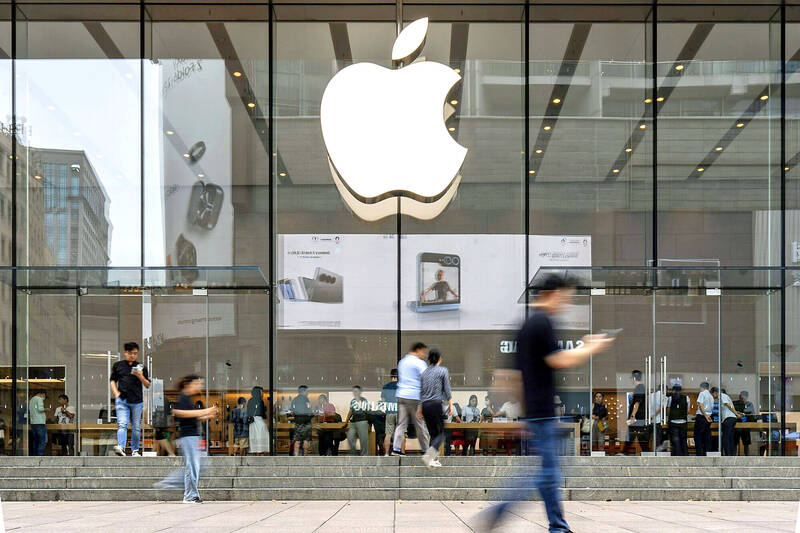Apple Inc has been warned by the EU to open up its highly guarded iPhone and iPad operating systems to rival technologies, or eventually risk significant fines under its flagship digital antitrust rules.
EU watchdogs announced under the bloc’s Digital Markets Act (DMA) that Apple must step into line with new laws on making operating systems fully functional with other technologies. The Brussels-based authority gave the company six months to comply, or face the threat of penalties.
While the announcement is a step shy of a formal investigation, the EU aims to compel Apple to re-engineer its services to allow rival companies to access the iPhone’s and iPad’s operating systems.

Photo: Bloomberg
“Today is the first time we use specification proceedings under the DMA to guide Apple towards effective compliance with its interoperability obligations,” EU Commissioner for Competition Margrethe Vestager said in a statement.
“Effective interoperability, for example with smartphones and their operating systems, plays an important role in this,” she said.
Cupertino, California-based Apple said it has created ways for developers to request additional interoperability with iPhone and iPad operating systems, while protecting users’ security. Undermining protections built into its systems would put European consumers at risk, the company added.
Apple shares rose 1.6 percent to US$224.25 in premarket trading. The EU announcement confirms an earlier report by Bloomberg.
One of the aims of the DMA is to ensure that other developers can gain access to key Apple features, such as its Siri voice commands and its payments chip.
The EU might later decide to launch a formal probe if Apple does not step into line with the DMA, which could eventually lead to hefty fines of up to 10 percent of global annual sales. It is already facing a parallel investigation into its App Store rules for developers, which could also lead to fines.
Earlier this month, Apple announced the latest version of its flagship device, the iPhone 16, betting it can entice consumers with modest hardware upgrades and artificial intelligence technology that is still on the horizon.
However, in June, the US giant said that certain features — including Apple Intelligence, iPhone mirroring and SharePlay screen sharing — would be held back from the EU, due to the DMA’s requirements on operating systems to work with third-party apps.

The US dollar was trading at NT$29.7 at 10am today on the Taipei Foreign Exchange, as the New Taiwan dollar gained NT$1.364 from the previous close last week. The NT dollar continued to rise today, after surging 3.07 percent on Friday. After opening at NT$30.91, the NT dollar gained more than NT$1 in just 15 minutes, briefly passing the NT$30 mark. Before the US Department of the Treasury's semi-annual currency report came out, expectations that the NT dollar would keep rising were already building. The NT dollar on Friday closed at NT$31.064, up by NT$0.953 — a 3.07 percent single-day gain. Today,

‘SHORT TERM’: The local currency would likely remain strong in the near term, driven by anticipated US trade pressure, capital inflows and expectations of a US Fed rate cut The US dollar is expected to fall below NT$30 in the near term, as traders anticipate increased pressure from Washington for Taiwan to allow the New Taiwan dollar to appreciate, Cathay United Bank (國泰世華銀行) chief economist Lin Chi-chao (林啟超) said. Following a sharp drop in the greenback against the NT dollar on Friday, Lin told the Central News Agency that the local currency is likely to remain strong in the short term, driven in part by market psychology surrounding anticipated US policy pressure. On Friday, the US dollar fell NT$0.953, or 3.07 percent, closing at NT$31.064 — its lowest level since Jan.

The New Taiwan dollar and Taiwanese stocks surged on signs that trade tensions between the world’s top two economies might start easing and as US tech earnings boosted the outlook of the nation’s semiconductor exports. The NT dollar strengthened as much as 3.8 percent versus the US dollar to 30.815, the biggest intraday gain since January 2011, closing at NT$31.064. The benchmark TAIEX jumped 2.73 percent to outperform the region’s equity gauges. Outlook for global trade improved after China said it is assessing possible trade talks with the US, providing a boost for the nation’s currency and shares. As the NT dollar

The Financial Supervisory Commission (FSC) yesterday met with some of the nation’s largest insurance companies as a skyrocketing New Taiwan dollar piles pressure on their hundreds of billions of dollars in US bond investments. The commission has asked some life insurance firms, among the biggest Asian holders of US debt, to discuss how the rapidly strengthening NT dollar has impacted their operations, people familiar with the matter said. The meeting took place as the NT dollar jumped as much as 5 percent yesterday, its biggest intraday gain in more than three decades. The local currency surged as exporters rushed to